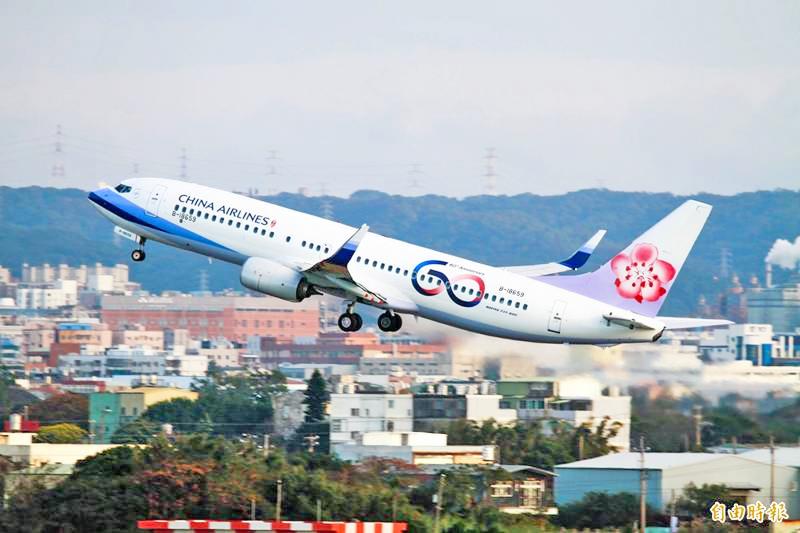China Airlines Ltd (中華航空) and its labor union on Thursday reached an agreement to distribute year-end bonuses of an average of six months wages, the best bonus distributed in the company’s 62-year history.
The airline is also to raise wages by at least 4 percent, matching salary increases for the nation’s teachers, military personnel and civil servants, the union said in a statement.
As the airline last year posted profit thanks to its booming air cargo business, the company would distribute generous bonuses, the union said.

Photo courtesy of China Airlines via CNA
With 21 cargo jets, China Airlines is the largest provider of air cargo services in Taiwan.
The company reported cumulative net profit of NT$1.55 billion (US$55.98 million) for the first three quarters of last year, compared with a net loss of NT$2.02 billion in the same period of 2020, the union said.
During the first 11 months of last year, revenue grew 16 percent annually to NT$121.94 billion, corporate data showed.
This year, the airline plans to continue focusing on its air cargo business, but would also try to boost its passenger business, the company said in a statement.
Separately, EVA Airways Corp (長榮航空) did not verify local media reports that it had agreed to distribute year-end bonuses of as high as about 1.5 months’ wages, but said that employees would receive bonuses based on their work performance.
EVA reported a cumulative net loss of NT$569 million in the first three quarters of last year, improving from a net loss of NT$3.64 billion in the same period of 2020, corporate data showed.
With seven cargo jets, EVA has a lower cargo capacity than China Airlines, and generated less revenue from its air freight business, data released by the two firms showed.
For the first 11 months of last year, EVA’s sales grew 11.8 percent to NT$91.5 billion, corporate data showed.
China Airlines’ share price fell 1.46 percent to NT$27 in Taipei trading yesterday, while EVA’s share price dipped 1.1 percent to NT$27, Taiwan Stock Exchange data showed.

SELL-OFF: Investors expect tariff-driven volatility as the local boarse reopens today, while analysts say government support and solid fundamentals would steady sentiment Local investors are bracing for a sharp market downturn today as the nation’s financial markets resume trading following a two-day closure for national holidays before the weekend, with sentiment rattled by US President Donald Trump’s sweeping tariff announcement. Trump’s unveiling of new “reciprocal tariffs” on Wednesday triggered a sell-off in global markets, with the FTSE Taiwan Index Futures — a benchmark for Taiwanese equities traded in Singapore — tumbling 9.2 percent over the past two sessions. Meanwhile, the American depositary receipts (ADRs) of Taiwan Semiconductor Manufacturing Co (TSMC, 台積電), the most heavily weighted stock on the TAIEX, plunged 13.8 percent in

A wave of stop-loss selling and panic selling hit Taiwan's stock market at its opening today, with the weighted index plunging 2,086 points — a drop of more than 9.7 percent — marking the largest intraday point and percentage loss on record. The index bottomed out at 19,212.02, while futures were locked limit-down, with more than 1,000 stocks hitting their daily drop limit. Three heavyweight stocks — Taiwan Semiconductor Manufacturing Co (TSMC, 台積電), Hon Hai Precision Industry Co (Foxconn, 鴻海精密) and MediaTek (聯發科) — hit their limit-down prices as soon as the market opened, falling to NT$848 (US$25.54), NT$138.5 and NT$1,295 respectively. TSMC's

TARIFFS: The global ‘panic atmosphere remains strong,’ and foreign investors have continued to sell their holdings since the start of the year, the Ministry of Finance said The government yesterday authorized the activation of its NT$500 billion (US$15.15 billion) National Stabilization Fund (NSF) to prop up the local stock market after two days of sharp falls in reaction to US President Donald Trump’s new import tariffs. The Ministry of Finance said in a statement after the market close that the steering committee of the fund had been given the go-ahead to intervene in the market to bolster Taiwanese shares in a time of crisis. The fund has been authorized to use its assets “to carry out market stabilization tasks as appropriate to maintain the stability of Taiwan’s

In a small town in Paraguay, a showdown is brewing between traditional producers of yerba mate, a bitter herbal tea popular across South America, and miners of a shinier treasure: gold. A rush for the precious metal is pitting mate growers and indigenous groups against the expanding operations of small-scale miners who, until recently, were their neighbors, not nemeses. “They [the miners] have destroyed everything... The canals, springs, swamps,” said Vidal Britez, president of the Yerba Mate Producers’ Association of the town of Paso Yobai, about 210km east of capital Asuncion. “You can see the pollution from the dead fish.